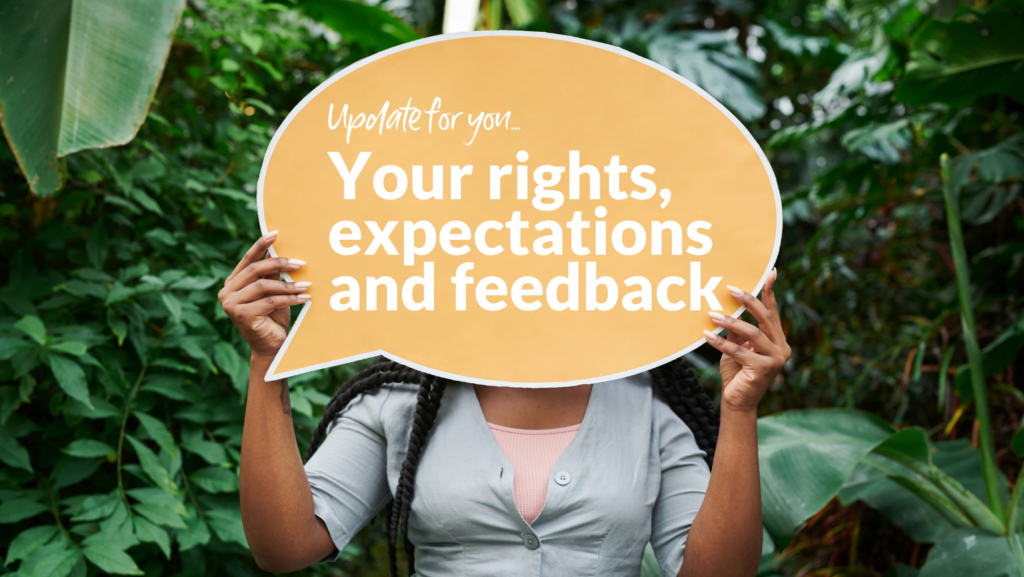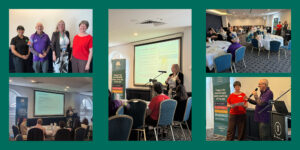You may be new to Arafmi or have been connected with Arafmi in some way over a number of years. It is important for all carers that we take time to remind everyone about rights, expectations and how to give feedback to ensure safe and supportive services and programs are maintained.
We ask you to take a couple of minutes to familiarise yourself with the following information.
As a carer connecting with Arafmi you can expect Arafmi will:
- only collect and store personal information that is considered essential for effective operation of Arafmi and the services for carers e.g. contact details for membership database, contact details to send newsletters and reminders for events
- will maintain confidentiality within Arafmi at all times
- will only release or transmit your personal information if you give relevant consent or we are required to share this by law. e.g. if you would like to be referred to another service we would gain your consent before making the referral and sharing personal details to a third party
- ask for your consent prior to recording material in visual and/or audio format. This includes having your consent prior to including images in newsletters, flyers and promotions
- ensure when collecting information for statistical and planning purposes we will only collect what is needed for these purposes and de-identify information when personal details are not needed to provide supports
- respect individuals’ choice not to share their name and or personal details when contacting Arafmi. We will however explain that we may be limited in what supports we can provide if we aren’t provided with certain details
- protect your privacy and make sure personal paper and electronic file / information is stored securely
- arrange for you to opt out of marketing and unsubscribe when this is requested
- behave honestly and with integrity
- provide safe, sensitive and appropriate programs for carers and their networks
- respect the opinions of others and approach any differences in opinion in an open and non-judgmental way
- receive and listen to your feedback ensuring this is responded to according to relevant policies and procedures
- actively seek feedback from carers and involve carers in decision making and planning where possible and appropriate
We also have expectations of carers which ensure we can provide safe and professional supports for other carers and volunteers and staff at Arafmi.
Expectations of carers include:
- letting us know what supports you need and how you want to receive these (eg over the phone, with an interpreter)
- maintain confidentiality when others have shared information of a sensitive and private nature e.g. in a group
- letting us know if you are unable to attend an appointment or event so we can try to reschedule an appointment at a convenient time or offer the space to another carer
- informing us if any of your relevant personal details change so we can update your records as needed e.g. moved house? changed email? – let us know so you don’t miss out of opportunities, events and information
- always treating others with respect and the way you would like to be treated
- providing feedback about the supports, programs and information provided. This includes sharing compliments, comments and feedback about any aspect that you are not satisfied with. Getting feedback is the only way we can know what is working well and what needs to be adapted and improved. We will actively seek feedback e.g. through surveys and you can give feedback at any other time.
Initially if you have feedback to give about any aspects of the programs and supports you can contact the Carer Support Team by
Phone: 07 3254 1881
Email: carersupport@arafmi.com.au
Write: PO Box 248 New Farm Qld 4005
If your feedback is of a sensitive or private nature you can email Frie Robinson (Carer Support Manager) at frierobinson@arafmi.com.au
If you are not satisfied with our response, you can then request a meeting to discuss the matter further with the CEO or their delegate.
Thank you for taking time to reading these reminders.
If you would like further information about the above, have any queries or would like to receive a copy of any of the following relevant policies please let us know:
- Policy 1.13 Confidentiality and Privacy
- Policy1.13.1 Website Privacy Policy
- Policy 1.14 Feedback, Complaints and Appeals Policy



